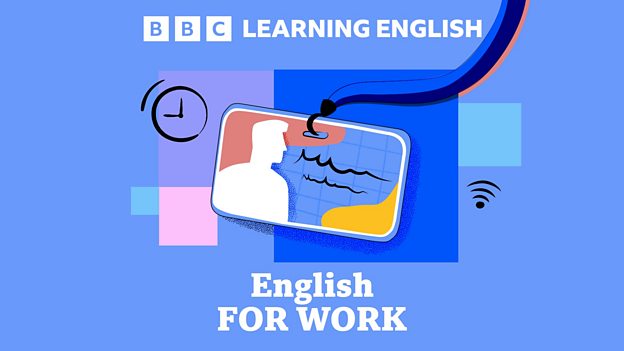6 Minute English
Intermediate level
Too old to have a baby?
Episode 240530 / 30 May 2024

______________________________________________________________________________________________________
Download a free 6 Minute English worksheet!
Download a free transcript!
______________________________________________________________________________________________________
Try more episodes of 6 Minute English:
Introduction
Why are women having babies later in life? What is society's attitude to older parents? Neil and Beth discuss this and teach you some useful vocabulary.
This week's question
How old was the oldest ever mum when she gave birth?
a) 53 years old?
b) 63 years old? or
c) 73 years old?
Listen to the programme to hear the answer.
Vocabulary
be in your forties (fifties, sixties etc)
the decade, or period of ten years, in your life when you are aged between 40 and 49
phenomena
facts or events, especially which are unusual or significant, that exist and can be observed and talked about
lingers
continues to exist longer than usual or expected
to father
to make a woman pregnant who then gives birth to a child
pat (someone) on the back
(idiom) used to describe giving someone praise, congratulations or encouragement
God forbid!
a way of saying that you hope something will not happen
TRANSCRIPT
Note: This is not a word-for-word transcript.
Neil
Hello. This is 6 Minute English from BBC Learning English. I’m Neil.
Beth
And I’m Beth. Women today are having fewer babies. More women are delaying having children until their forties - the period of ten years in life between 40 and 49. And some women are giving birth in their fifties, their sixties, even their seventies!
Neil
There are many reasons behind the trend for older mums including better access to education and careers. But there are also health risks to having children later in life, so in this programme we’ll be asking: when are you too old to have a baby? And, as usual, we’ll be learning some useful new vocabulary as well.
Beth
But first I have a question for you, Neil. In 2019, Mangayamma Yaramati gave birth to twins in the state of Andhra Pradesh, South India. But these were no ordinary twins because Mangayamma was the oldest recorded woman ever to give birth. So how old was the oldest ever mum when she gave birth. Was she:
a) 53 years-old?
b) 63 years old? or
c) 73 years old?
Neil
Hmm, I'm going to guess 63.
Beth
OK, Neil, we’ll find out the correct answer at the end of the programme. Professor of reproductive science at University College London, Joyce Harper, has been studying the trend of women choosing to have babies later in life. Here she shares her discoveries with BBC World Service programme, Global Story:
Prof Joyce Harper
Ten, twenty, thirty years ago, women were having children at a much younger age. Now it’s become quite normal for women in their thirties, as we see with the world data, there’s many countries where women have their first birth over the age of 30. But this is quite a new phenomena… that’s why this term ‘geriatric mother’ unfortunately still lingers.
Beth
Professor Harper uses the word phenomena to describe the trend for older mothers. Phenomena are unusual or significant facts and events that exist and are talked about. People often get this wrong, but the plural form is phenomena and the singular is phenomenon.
Neil
The concept of older mothers is still quite a new phenomenon, and attitudes towards them are changing. Mothers over the age of 35 used to be called ‘geriatric’, a word many found offensive. Fortunately, this term is no longer used, but social disapproval of older mothers still lingers. If something lingers it continues to exist longer than usual or expected.
Beth
Yes, in some cultures older mothers are still disapproved of. But wait a minute, Neil - it takes two to make a baby! What’s the man’s role in all this?
Neil
Well, unlike women, whose ability to naturally get pregnant declines sharply in their forties, men’s fertility lasts longer. Rolling Stone, Mick Jagger, famously had his eighth child with his 29-year-old partner at the age of 73. So, are older fathers more socially acceptable than older mothers? ‘Yes’ thinks Professor Harper, as she explained to BBC World Service’s, Global Story:
Prof Joyce Harper
We do have a bit of a gender problem here because if this was a man in his sixties, seventies and even eighties, and he’s fathered a child, most people would pat him on the back. But they’d probably pat him on the back because he’s absolutely got a much younger partner. But if we’ve got a woman in her sixties, seventies or, God forbid, eighties having a child, then it does have a sort of shock reaction, and makes people feel uncomfortable.
Beth
Professor Harper thinks that society is more accepting of older fathers than older mothers. A 70-year-old man can still father a child – he can make a woman pregnant who then gives birth, and most people would pat him on the back, an idiom meaning give someone praise or congratulations.
Neil
On the other hand, says Professor Harper, God forbid a woman having a baby in her eighties! Here, the phrase God forbid! is used as a way of saying you hope something will not happen.
Beth
There’s another side to this story, though. In the west, young women from Gen Z, the generation born since the year 2000, are saying they won’t have children at all.
Neil
In more traditional countries meanwhile, a woman’s role is as a mother, and many pray to God to be blessed with a child.
Beth
Which is exactly what happened to Mangayamma Yaramati, the South Indian woman I asked you about in my question. In 2019, she became the oldest recorded woman ever to give birth.
Neil
Right, and I guessed she was 63 years old at the time.
Beth
Which was… the wrong answer I’m afraid. In fact she was even older – 73. OK, let’s recap the vocabulary we’ve learned in this programme, starting with the phrase in your forties, which describes the period of ten years in someone’s life when they’re aged between 40 and 49.
Neil
Phenomena describes any significant facts or events that we know exist, and can be observed and discussed.
Beth
If something lingers, it continues to exist longer than usual or expected.
Neil
The verb to father means to make a woman pregnant who then gives birth to a child.
Beth
The idiom pat someone on the back is used to describe giving someone praise, congratulations or encouragement.
Neil
And finally, the expression God forbid! is a way of saying that you hope something will not happen. Once again our six minutes are up, but don’t forget to join us again soon for more trending topics and useful vocabulary, here at 6 Minute English. Goodbye for now!
Beth
Bye!
Click here to listen to the full episode of 'Are you ever too old to have a baby?' from BBC's The Global Story
Latest 6 Minute English

Embarrassed to go to the doctor?
Episode 241226 / 26 Dec 2024
Have you ever been embarrassed to go to the doctor?
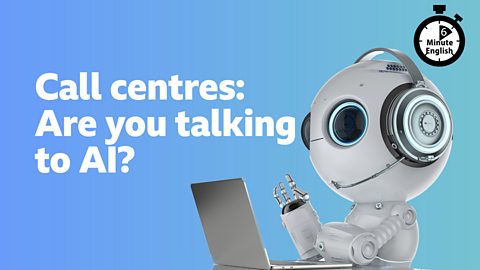
Call centres: Are you talking to AI?
Episode 241219 / 19 Dec 2024
Have you ever phoned up a company and had your call held in a queue? Could AI make this less painful?

Making 'mum friends'
Episode 241212 / 12 Dec 2024
Is making new ‘mum friends’ the positive experience it’s often described as?

Can you trust ancestry DNA kits?
Episode 241205 / 05 Dec 2024
Are DNA ancestry tests a reliable way to trace your ancestry?
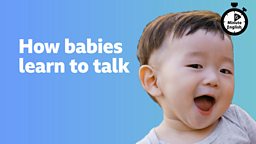
How babies learn to talk
Episode 241128 / 28 Nov 2024
What do babies need to learn to do to be able to talk?


The bond between sisters
Episode 241114 / 14 Nov 2024
Are the stereotypes about older and younger sisters true?


Why you need a good night's sleep
Episode 241031 / 31 Oct 2024
Why is it so important to get a good night's sleep?

Divorce: Why does it happen?
Episode 241024 / 24 Oct 2024
How is divorce talked about in different countries?


Did Taylor Swift fans cause an earthquake?
Episode 241010 / 10 Oct 2024
Did Taylor Swift move the Earth?

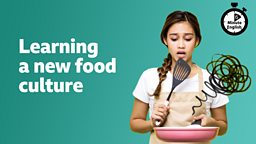
Learning a new food culture
Episode 240926 / 26 Sep 2024
Would you find it different to adapt to a new food culture?

Saving water in the driest place on Earth
Episode 240919 / 19 Sep 2024
How do farmers in the driest place on Earth manage to grow crops? With this solution!



Chocolate: Meet a real Willy Wonka
Episode 240829 / 29 Aug 2024
Would you like to be a chocolate maker, like Roald Dahl's Willy Wonka?

Why we love dumplings
Episode 240822 / 22 Aug 2024
Warning! This episode might make you very hungry...

Kids and climate change
Episode 240815 / 15 Aug 2024
What are young people's thoughts on climate change?


The science of falling in love
Episode 240801 / 01 Aug 2024
What's really happening in our brain when we fall in love?

AI to reduce animal testing
Episode 240718 / 18 Jul 2024
Could AI reduce the need for animal testing?

Why read books, not screens?
Episode 240718 / 25 Jul 2024
Why is it better to read from a book than a screen?

The school that puts the kids in charge
Episode 240711 / 11 Jul 2024
What happens when you put the kids in charge of the school?

What can we learn from toddlers?
Episode 240704 / 04 Jul 2024
Learn to speak to yourself in the way that toddlers do!

How learning to read changes lives
Episode 240627 / 27 Jun 2024
How can literacy change people's lives?

Building a better world with wood?
Episode 240620 / 20 Jun 2024
How can buildings made from wood help our mental health?

How names can tell painful stories
Episode 240613 / 13 Jun 2024
Could our name have painful baggage?

E-rickshaws driving away pollution
Episode 240606 / 06 Jun 2024
Could E-rickshaws give us cleaner air?




Bitter food, better health?
Episode 240509 / 09 May 2024
Could bitter foods be better for your health?
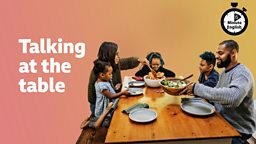






Disability in music and theatre
Episode 240321 / 21 Mar 2024
Learn about the people who are making it easier for disabled musicians and music fans to perform and see live music


Sewing to fight period poverty
Episode 240307 / 07 Mar 2024
Period poverty affects over 500 million people worldwide. How can a volunteer project help?

Plastic waste eaten by enzymes
Episode 240229 / 29 Feb 2024
Plastics can be difficult to recycle. Could a recently discovered enzyme help?
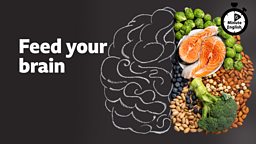
Feed your brain
Episode 240222 / 22 Feb 2024
Food is fuel for our brains. So, what should we be eating?
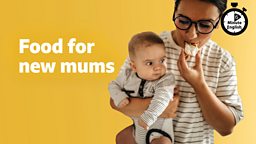
Food for new mums
Episode 240215 / 15 Feb 2024
Having a baby is exhausting! What do mothers need to eat after giving birth?
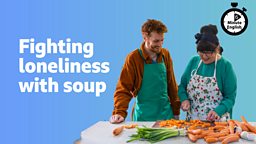
Fighting loneliness with soup
Episode 240208 / 08 Feb 2024
Hear how a project in the Netherlands is helping in the fight against loneliness

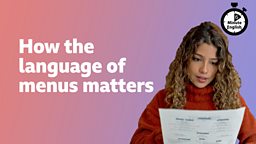
How the language of menus matters
Episode 240125 / 25 Jan 2024
Why is the language used on menus important?



